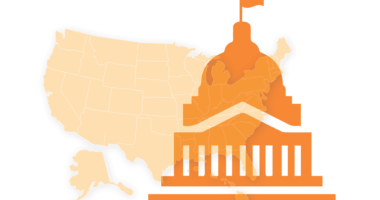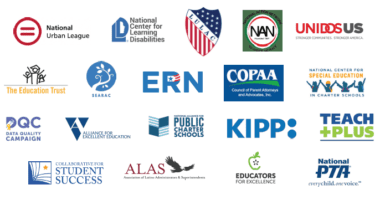Denise Forte Testifies on Heading Back to School and Reopening Safely
United States House Committee on Education and Labor
Early Childhood, Elementary, and Secondary Education Subcommittee
“Back to School: Highlighting Best Practices for Safely Reopening Schools”
Good morning Chairman Sablan, Ranking Member Owens, Chairman Scott, and members of the Committee. My name is Denise Forte, and I am the Interim CEO of The Education Trust, a national nonprofit research and advocacy organization dedicated to closing opportunity gaps in education that disproportionately impact students of color and students from low-income backgrounds. As noted, I was also a Congressional staff member for 20 years, most recently as the Staff Director for the Education and the Workforce Committee, so it is truly an honor to return to the Committee today. In my other full-time job – I am the proud mother of two sons who attend public schools here in Washington DC, and are experiencing firsthand the return to school after spending a year at home in virtual settings. Today, I am pleased to share The Education Trust’s thoughts on how we collectively address the longstanding inequities that we know existed before COVID-19 and have grown, how we support student and community voice, and implement evidence based and equitable solutions to ensure students’ success.
As this school year is underway, district leaders and educators across the country are working hard to meet the needs of students, families, and staff using vital American Rescue Plan funds. The Education Trust has spent the last 18 months working with advocates from the civil rights, disability rights, business, educator, and parent communities to center their voices in the recovery effort and highlight promising actions taken by states and districts. Today, we are urging state and local leaders to take the following actions:
First, state and school district leaders must address the immediate needs of educators, students, and families.
Parents understand that in-person learning is preferable. However, many families of color, especially Black families, have reasonable mistrust toward our public school and health care systems. Trust between school leaders, community members and parents is the foundation of a strong and safe school community, and maximizes student outcomes. Leaders should actively inform, and invite conversations with families. Trust also is built when districts and schools marshal their resources to provide safe, in-person learning through adequate testing and contract tracing; building upgrades to replace faulty and out-of-date ventilation; basic public health protocols such as mandatory masking, distancing, and handwashing; and access to COVID-19 vaccinations.
Second, states and school districts must ensure that funding is used equitably to address students’ social, emotional, and academic development.
Beyond addressing the immediate physical safety needs of students, educators, and staff, we must do everything in our collective power to ensure that children reach their highest academic potential and overcome the devastating impact of over a year and a half of unfinished learning.
Our research indicates, when implemented under the right conditions, there are two strategies that are most effective to accelerate learning: targeted intensive tutoring and expanded learning time. We also know that strong, positive relationships with teachers and school staff can dramatically enhance students’ motivation, academic engagement, and social skills.
In close partnership with a diverse and representative set of stakeholders, states should support districts and schools to identify and implement evidence-based strategies to accelerate student learning; meet students’ social, emotional, and academic needs; and ensure effective and equitable implementation.
These efforts should include: high-quality statewide summative assessments to help target additional resources; professional learning opportunities for educators to ensure students have the opportunity to reach high standards; strategies for leveraging school-based teacher leadership, distributed leadership, and innovative staffing models to provide supervision and support to tutors and teachers. Additionally, they can and should invest in high-quality, culturally responsive instructional materials that teach the truth about the history of this country. We also call upon states and school districts to provide clear and accessible information about how they are spending precious relief dollars.
Finally, states and school districts must ensure that funding is used to lay the foundation to address the inequities that were exacerbated by COVID-19.
State and local leaders should be planning for how ARP funds and other resources can yield lasting structural change. Congress should support these efforts in a variety of areas, including passing legislation to increase equitable access to early childhood education, advanced coursework, home broadband, strong and diverse educators, and school meals; limit and eliminate discriminatory school discipline practices; and incentivize states and localities to make their education funding formulas more equitable.
In closing, The Education Trust looks forward to assisting state and local leaders, Congress, and the administration in deploying resources in equitable ways that address the needs of underserved students and close opportunity and access gaps. Thank you for the opportunity to speak with you today. I look forward to taking your questions.





